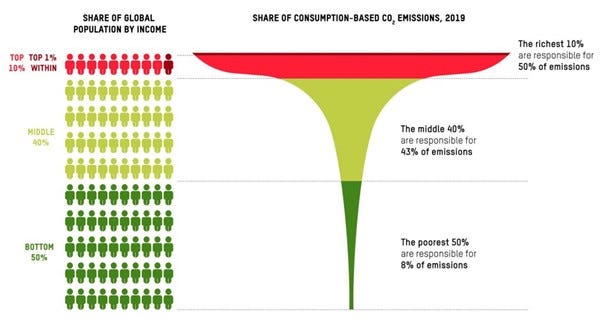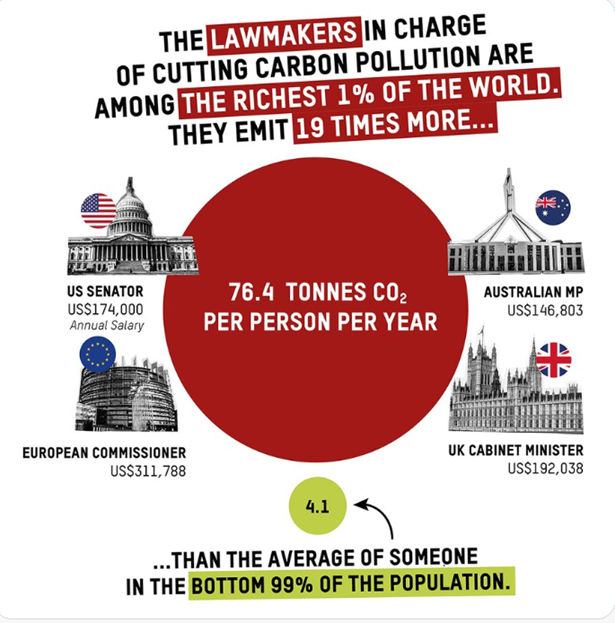“There are very important arguments around tackling inequality, for all sorts of good reasons. But if you say that you have to wait for that [inequality to be eliminated] before you cut back emissions, then you are misunderstanding the complexity and misunderstanding the opportunities. If you had to wait for a radical rewriting of inequality across the world, we would be too late. We can’t make the transition [to net zero] depend on that, as time is of the essence.” Nick Stern.
Nick Stern is one of the most famous technocratic climate gurus. Formerly chief economist at the World Bank, he has led the way in making the case that fighting climate change is both economically affordable and good sense. I have a lot of respect for the huge work he has done, but on this I have to say I completely disagree with him.
Our new report, Climate Equality- A Planet for the 99% which was published this week makes the opposite case. That unless we focus on inequality, and in particular the extreme carbon pollution of extremely rich individuals, we will never beat climate breakdown.
Right out in front
I think that one of the strangest things about today’s world is that the right are far more class conscious than the left. They understand that securing change in societies is primarily a societal, and political thing, not a technocratic one.
This means that the last decade has seen an out of touch, broadly socially liberal but economically neoliberal elite consistently ‘surprised’ by the rapid rise in support for the far right. My huge concern is that the latest casualty of this now quite familiar process are the policies we need to stop our planet being destroyed.
Where Nick Stern is completely right is that time is of the essence. We have only a few years to cut carbon enough to prevent catastrophic global heating. To do this, we need more than anything, huge transitions away from fossil fuels at national level, particularly in US and other rich nations.
To do this we need broad support across society, and the scary thing is that the opposite is increasingly true. Instead, the right are seizing on environmental policies and successfully presenting them as policies foisted on ordinary people by an out of touch, metropolitan, liberal elite who have no understanding of their lives. This in turn leads to a backlash (or ‘greenlash’) and the inevitable reversal or dramatic watering down of vital climate policies that are needed so urgently. An early case of this was the Yellow Vest movement in France, and more recently in the UK the backlash over policies to extend tighter regulations on clean air in London gave Rishi Sunak the opportunity to ditch his governments’ climate commitments, and in Germany, the policy of moving away from gas heating was exploited by the right, leading to a rapid watering down of the policy.
In short, it seems to me that the right has already started making climate policy all about class, on their own terms, and in ways that are already dangerously delaying the action needed to stop climate breakdown.
In a class of their own
I think that perhaps the main reason the right are able to do this is because class has been ignored by the left, and particularly the centre-left for so long, as they have fully bought into the neoliberal worldview and mind meld with the centre right. The rejection of the importance of class; the denial that inequality matters; both are at the centre of neoliberal thinking. Culturally neoliberals reject class conflict as a relic from the past. Economically, neoliberal economics is wilfully distribution blind. And socially, decades of neoliberalism have undermined social mobility so dramatically that those leading many of our countries are drawn from the same tone-deaf, myopic elite class.
Climate policies and politics, which have come to the fore in this era, swim in this neoliberal sea. Policies like flat carbon taxes are promoted, or higher taxes on energy, disregarding the fact that in every society, ordinary people spend a much higher proportion of their incomes on these essentials, and such policies are unfair and regressive. The story that surrounds this, in supposedly classless rich countries, is very much ‘we all need to change the way we live to save the planet’ and ‘we need to face up to the fact that we cannot live the way we have been’. This unsurprisingly angers the working classes who are more than ever struggling to make ends meet, to keep the lights on and to feed their families, whilst the richest 1% fly off on their third holiday seeking winter sun. It is not I think that working people are any less aware of supportive of action to tackle climate change- it is the realities of everyday survival and the obvious double standards that are driving this rejection of climate policy and the success of the right in this area.
Ecology without class struggle is gardening.
I basically think that you don’t have to be tremendously left wing to think that bringing inequality and climate change together is good politics and will drive a more rapid transition away from fossil fuels.
Let’s have climate policies that are clearly and obviously progressive. Not flat carbon taxes, progressive ones. Taxing rich peoples’ income and wealth too is inherently green, as it will reduce their emissions, and the revenue raised can be used to support the transition away from fossil fuels. Taxing investments in polluting industries at a punitive rate is also a good idea. Tax is not enough though. We need bans too. Let’s ban private jets altogether, and super yachts too. These need to be policies that are not just effective in fighting climate change but that are very clearly progressive.
Above all we need to structural shift in rich economies away from the relentless pursuit of growth and profit based on ever-greater consumption by an elite; structural shifts that must by necessity at the same time make our world far more equal if they are to have a chance of happening.
The political obstacles to doing this are enormous, as they fly in the face of the interests of the most powerful people, and the most powerful corporations. The very much prefer the status quo, and seek to define the climate debate in these terms too, as Kevin Anderson, a climate scientist, put it much better than I could this week: ‘The 1% group use their hugely disproportionate power to manipulate social aspirations and the narratives around climate change. These extend from highly funded programmes of lying and advertising to proposing pseudo-technical solutions, from the financialisation of carbon to labelling extreme any meaningful narrative that questions inequality and power. Such a dangerous framing is compounded by a typically supine media owned or controlled by the 1%. The tendrils of the 1% have twisted society into something deeply self-destructive.’
But whilst daunting, I truly believe they are not insuperable, and as we saw this week with millionaires in the UK demanding they are taxed more, there are many rich people too who want a more equal world and understand that this is vital to saving our planet. Step one is to consistently and clearly focus on the role of the richest are playing, with their consumption, their investments, and their influence, in driving us over the climate cliff- and our report is I hope a contribution to doing just this.
Which brings me back to Nick Stern. In his world of elite, genuinely well-meaning technocrats, they fear that focusing on politics too much will somehow slow down the change that is coming. Perhaps they are right, and that if we just keep the politics and the class struggle out of climate policy, we can do the right thing. But I think if the last two decades of climate negotiations have shown us anything at all, it is that this doesn’t seem to be working, and in fact is backfiring as right-wing forces seek to do this instead. Time is indeed of the essence, and we need to rapidly combine the fight for a more equal world with the fight to save it.
END.
Author: Max Lawson, Head of Inequality Policy at Oxfam International and EQUALS podcast co-host. He is also the co-chair of the Global People’s Vaccine Alliance.
Read and subscribe to our EQUALS Substack Newsletter and watch out for EQUALS podcast new season.








